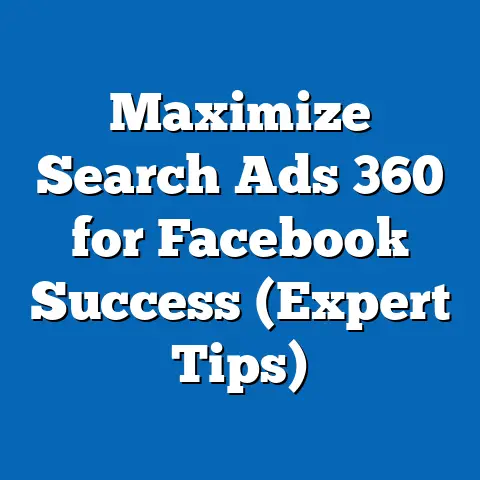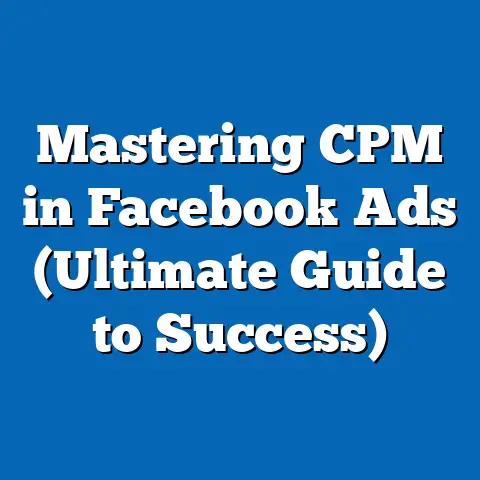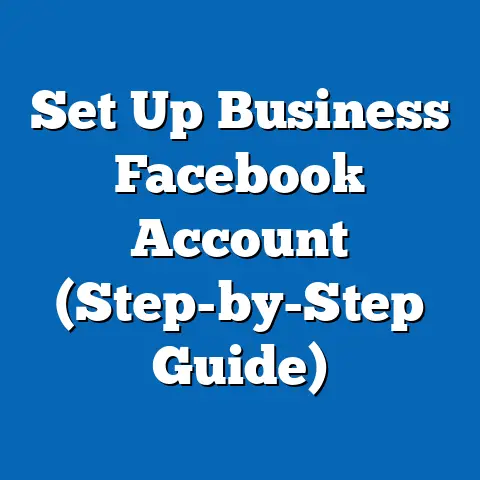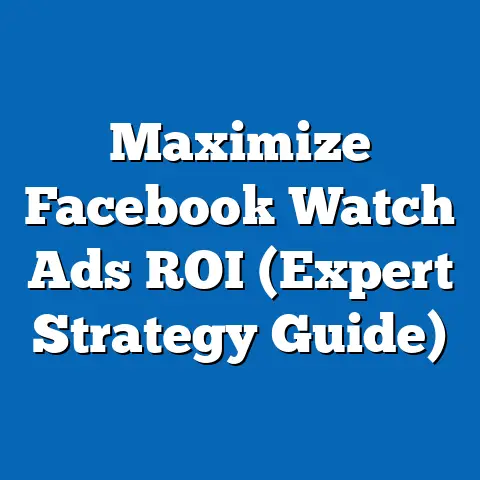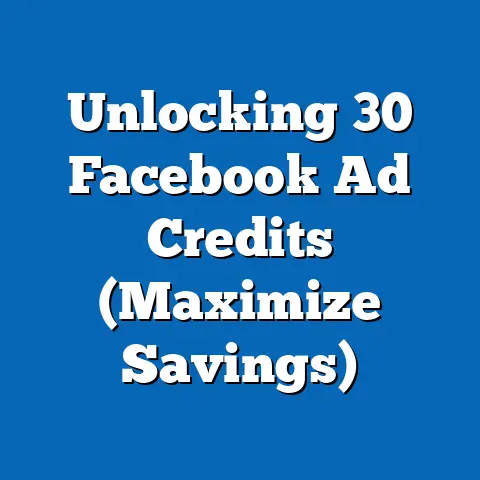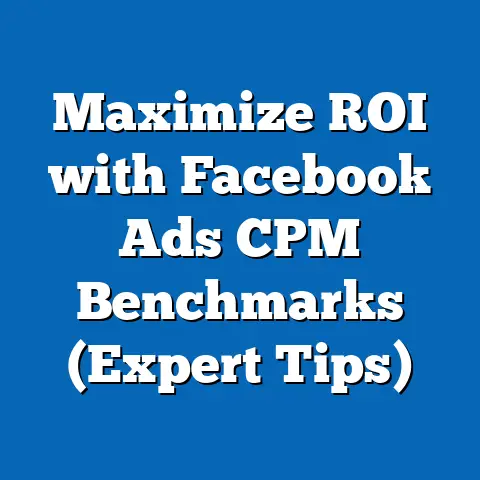Get Instant Help with Facebook Ads Support (Expert Guide)
The world has gone digital, and for small business owners, marketers, and entrepreneurs, that means Facebook ads are no longer optional – they’re essential.
It’s like having a virtual storefront open 24/7, allowing you to reach potential customers while they scroll through their feeds.
I’ve seen firsthand how a well-crafted Facebook ad campaign can transform a struggling business into a thriving one.
But let’s be honest, navigating the ever-changing landscape of Facebook advertising can be a real headache.
That’s where understanding and utilizing Facebook Ads Support becomes crucial.
This isn’t just about making ads; it’s about building a sustainable, thriving business.
In this guide, I’ll walk you through everything you need to know to get the help you need, when you need it, so you can focus on what you do best – running your business.
Understanding Facebook Ads
Facebook Ads, at their core, are a powerful tool for digital marketing, enabling businesses to reach a highly targeted audience on the world’s largest social media platform.
Think of it as a digital billboard, but instead of being limited to a specific location, you can display your message to people based on their interests, demographics, behaviors, and much more.
The significance of Facebook Ads lies in their ability to offer unparalleled reach and targeting capabilities.
Unlike traditional marketing methods, which often cast a wide net, Facebook Ads allow you to pinpoint your ideal customer with incredible precision.
This means you can maximize your advertising spend by focusing on the people most likely to be interested in your products or services.
Different Ad Formats for Different Needs
One of the things I appreciate most about Facebook Ads is the variety of ad formats available.
Each format caters to different business goals and lifestyle needs.
Here are a few examples:
- Carousel Ads: These allow you to showcase multiple products or features in a single ad.
I once used a carousel ad to highlight different flavors of my artisanal coffee beans, and it significantly boosted my sales. - Video Ads: Video is king when it comes to engagement.
Short, attention-grabbing video ads can be incredibly effective for capturing attention and conveying your message. - Slideshow Ads: If you don’t have a video, slideshow ads are a great alternative.
They combine images and text to create a visually appealing experience. - Image Ads: Simple yet effective, image ads are perfect for showcasing a single product or service.
Make sure your images are high-quality and visually appealing. - Collection Ads: These ads are designed for e-commerce businesses, allowing you to showcase a collection of products in a visually engaging format.
Each of these formats caters to different needs and goals.
For example, if you’re a small business owner juggling multiple tasks, video ads might seem daunting, but with tools like Canva, creating compelling video ads has become much easier.
For me, understanding which format aligns with your brand’s message and audience is the first step to success.
Navigating the Facebook Ads Ecosystem
The Facebook Ads ecosystem can seem overwhelming at first, but once you understand the key components, it becomes much more manageable.
Here are some of the essential elements:
- Ads Manager: This is your central hub for creating, managing, and analyzing your Facebook Ads campaigns.
It’s where you’ll set your budget, target your audience, and track your results. - Audience Targeting: Facebook’s audience targeting capabilities are incredibly powerful.
You can target people based on their interests, demographics, behaviors, and even custom audiences created from your own customer data. - Budgeting: Setting a budget is crucial for managing your advertising spend.
You can choose between a daily budget or a lifetime budget, depending on your needs. - Ad Placement: You can choose where your ads appear, including Facebook, Instagram, Audience Network, and Messenger.
- Pixel: The Facebook Pixel is a small piece of code that you install on your website.
It allows you to track conversions, optimize your ads, and build retargeting audiences.
The Facebook Ads Manager is your command center.
It’s where you’ll spend most of your time creating, managing, and analyzing your campaigns.
The interface is intuitive, but it can be overwhelming at first.
Take some time to explore the different features and options available.
One of the most powerful aspects of Facebook Ads is the ability to target your audience with laser-like precision.
You can target people based on their demographics (age, gender, location), interests (hobbies, passions, favorite brands), behaviors (purchase history, online activity), and even custom audiences built from your own customer data.
Takeaway: Understanding the basics of Facebook Ads, including the various ad formats and the key components of the ecosystem, is essential for success.
Take the time to familiarize yourself with the Ads Manager interface and explore the different targeting options available.
Common Challenges Faced by Advertisers
Even with the best intentions and a solid understanding of Facebook Ads, advertisers often encounter challenges that can derail their campaigns.
These challenges can range from technical glitches to strategic missteps, and they can have a significant impact on your business.
Common Pitfalls to Watch Out For
- Ad Rejection: One of the most frustrating experiences is having your ad rejected by Facebook.
This can happen for a variety of reasons, including violating Facebook’s advertising policies, using inappropriate content, or targeting the wrong audience. - Ineffective Targeting: Even if your ad is approved, it won’t be successful if you’re not targeting the right audience.
Ineffective targeting can lead to low engagement rates and wasted ad spend. - Budget Management: Managing your budget effectively is crucial for maximizing your ROI.
Overspending can quickly deplete your resources, while underspending can limit your reach. - Low Engagement Rates: If your ads aren’t resonating with your audience, you’ll likely see low engagement rates.
This can be a sign that your ad copy, visuals, or targeting are off. - Technical Issues: Technical issues, such as pixel errors or website glitches, can also hinder your campaign’s performance.
I remember when I first started using Facebook Ads, I had an ad rejected because I accidentally used a copyrighted image.
It was a frustrating experience, but it taught me the importance of carefully reviewing Facebook’s advertising policies.
The Emotional Impact of Advertising Challenges
These challenges can take a toll on business owners, both emotionally and financially.
The stress of managing ad campaigns, dealing with ad rejections, and worrying about wasted ad spend can lead to burnout and frustration.
For small business owners, who often wear multiple hats, the time spent troubleshooting ad issues can take away from other important tasks.
This can disrupt their work-life balance and negatively impact their mental health.
Statistics and Case Studies
According to a recent survey, 60% of small business owners report feeling overwhelmed by the complexities of digital marketing.
This highlights the need for accessible and reliable support for Facebook Ads.
I’ve heard countless stories from business owners who have struggled with Facebook Ads.
One client, a local bakery owner, told me that she almost gave up on Facebook Ads after having several ads rejected.
However, with the right support and guidance, she was able to turn things around and build a successful advertising campaign that drove significant sales.
Takeaway: Recognizing the common challenges faced by advertisers, as well as the emotional impact they can have, is crucial for seeking timely support and guidance.
Don’t be afraid to ask for help when you need it.
When to Seek Facebook Ads Support
Knowing when to seek help with your Facebook Ads is just as important as knowing how to access that help.
Waiting too long can lead to wasted ad spend, missed opportunities, and unnecessary frustration.
Specific Scenarios That Warrant Support
- Ad Disapproval: If your ad is disapproved, it’s essential to understand why and take steps to fix it.
Facebook’s advertising policies can be complex, and it’s easy to make mistakes. - Low Engagement Rates: If your ads aren’t generating the engagement you expect, it’s time to re-evaluate your strategy.
This could involve tweaking your ad copy, visuals, or targeting. - Technical Issues: Technical issues, such as pixel errors or website glitches, can significantly impact your campaign’s performance.
If you’re not tech-savvy, it’s best to seek help from a professional. - Unexpected Budget Spikes: If you notice your budget is being spent much faster than expected, it’s important to investigate the cause.
This could be due to incorrect budget settings or unexpected traffic spikes. - Stagnant Performance: If your campaign’s performance has plateaued, it’s time to try new strategies.
This could involve A/B testing different ad variations or exploring new targeting options.
In my experience, it’s always better to be proactive than reactive.
If you’re unsure about something, don’t hesitate to reach out for help.
The Impact on Lifestyle Choices
Failing to address these issues promptly can have a ripple effect on your lifestyle.
For example, if your ad campaign is underperforming, you might feel pressured to work longer hours to make up for the lost revenue.
This can lead to burnout and negatively impact your work-life balance.
Moreover, the stress of managing ad campaigns can affect your mental health.
Worrying about wasted ad spend and missed opportunities can lead to anxiety and frustration.
Anecdotes and Quotes from Business Owners
I’ve spoken to many business owners who have shared their experiences with Facebook Ads Support.
One client, a local restaurant owner, told me that she almost gave up on Facebook Ads after having several ads rejected.
However, with the help of Facebook Support, she was able to understand the policies and create ads that were both effective and compliant.
Another client, a freelance graphic designer, said that she was struggling to understand how to use the Facebook Pixel.
After reaching out to Facebook Support, she received clear and concise instructions that helped her set up the pixel correctly and track conversions effectively.
Takeaway: Don’t wait until things get out of hand before seeking help with your Facebook Ads.
Be proactive and reach out for support whenever you encounter challenges or have questions.
How to Access Facebook Ads Support
Navigating the world of Facebook Ads Support can feel like trying to find your way through a maze, but it’s a skill that can save you time, money, and a whole lot of frustration.
Over the years, I’ve learned the ins and outs of accessing help, and I’m here to share my knowledge.
Different Methods of Accessing Support
Facebook offers several avenues for seeking help with your ads, each with its own strengths and weaknesses:
- The Help Center: This is your first stop for finding answers to common questions.
The Help Center is a comprehensive resource that covers a wide range of topics, from setting up your account to troubleshooting ad issues. - Chat Support: For more immediate assistance, you can use Facebook’s chat support feature.
This allows you to connect with a support agent in real-time and get personalized help with your specific issue. - Email Support: If your issue isn’t urgent, you can submit a support request via email.
This is a good option for complex issues that require detailed explanations. - Community Forums: Facebook’s community forums are a great place to connect with other advertisers and get advice from experienced users.
You can also find answers to common questions and share your own experiences.
Navigating These Resources Effectively
Each of these resources has its own unique strengths and weaknesses.
The Help Center is a great starting point for finding answers to common questions, but it can be overwhelming if you don’t know where to look.
Chat support is ideal for urgent issues that require immediate attention, but it’s not always available.
Email support is a good option for complex issues, but it can take several days to get a response.
Community forums are a great place to connect with other advertisers, but the advice you receive may not always be accurate or up-to-date.
Tips for Quicker Resolutions
- Be Prepared: Before reaching out for support, gather all the relevant information about your issue.
This includes your ad ID, campaign name, and a detailed description of the problem. - Be Clear and Concise: When describing your issue, be as clear and concise as possible.
Use screenshots or videos to illustrate the problem. - Be Patient: Keep in mind that Facebook Support agents are dealing with a high volume of requests.
Be patient and polite, and they’ll be more likely to help you. - Follow Up: If you don’t receive a response within a reasonable timeframe, follow up on your request.
I remember one time when I was having trouble setting up a custom audience.
I spent hours searching the Help Center, but I couldn’t find the answer I was looking for.
Finally, I reached out to chat support, and the agent was able to walk me through the process step-by-step.
The Importance of a Clear Plan and Documentation
Before reaching out for support, it’s important to have a clear plan and documentation.
This will help you communicate your issue effectively and ensure that you receive the help you need.
- Document Your Steps: Keep a record of the steps you’ve taken to troubleshoot the issue.
This will help the support agent understand what you’ve already tried. - Take Screenshots: Take screenshots of any error messages or unusual behavior.
This will provide visual evidence of the problem. - Create a Summary: Write a brief summary of the issue, including the steps you’ve taken to troubleshoot it and the results you’ve observed.
Takeaway: Knowing how to access Facebook Ads Support and navigate the various resources available is essential for resolving issues quickly and efficiently.
Be prepared, be clear, and be patient, and you’ll be more likely to get the help you need.
Utilizing Facebook Business Resources
Beyond the standard support channels, Facebook offers a wealth of resources designed to empower advertisers and enhance their skills.
These resources can be a game-changer, providing you with the knowledge and tools you need to succeed on the platform.
Facebook Blueprint: Your Training Ground
Facebook Blueprint is a comprehensive training and certification program that covers a wide range of topics related to Facebook advertising.
From basic concepts to advanced strategies, Blueprint offers courses for advertisers of all skill levels.
The program includes both free and paid courses, covering topics such as:
- Facebook Ads Fundamentals: Learn the basics of creating and managing Facebook Ads campaigns.
- Audience Targeting: Master the art of targeting the right audience for your ads.
- Ad Creative: Discover how to create compelling ad copy and visuals that resonate with your audience.
- Campaign Optimization: Learn how to optimize your campaigns for maximum ROI.
Earning a Facebook Blueprint certification can boost your credibility and demonstrate your expertise in Facebook advertising.
I personally found the Blueprint courses incredibly helpful when I was first starting out.
They provided me with a solid foundation in Facebook advertising and helped me avoid common mistakes.
Business Help Center: Your Go-To Guide
The Business Help Center is a comprehensive resource that provides answers to common questions and guidance on a wide range of topics related to Facebook advertising.
The Help Center includes articles, videos, and tutorials on topics such as:
- Account Setup: Learn how to set up your Facebook Business account and connect it to your ad account.
- Ad Creation: Discover how to create different types of Facebook Ads, including image ads, video ads, and carousel ads.
- Audience Targeting: Learn how to target your audience based on demographics, interests, behaviors, and custom audiences.
- Budget Management: Discover how to set your budget and manage your ad spend effectively.
- Reporting and Analytics: Learn how to track your campaign’s performance and analyze your results.
Case Studies and Success Stories: Learning from the Best
Facebook regularly publishes case studies and success stories that showcase how businesses have used Facebook Ads to achieve their goals.
These stories can provide valuable insights and inspiration for your own campaigns.
By studying these case studies, you can learn:
- Effective Strategies: Discover what strategies have worked for other businesses in your industry.
- Creative Ideas: Get inspiration for your own ad copy and visuals.
- Innovative Approaches: Learn about new and innovative ways to use Facebook Ads.
I always find it helpful to read case studies and success stories before launching a new campaign.
They provide me with a sense of what’s possible and help me avoid common pitfalls.
Empowering Users and Enhancing Skills
By utilizing these resources, you can empower yourself with the knowledge and skills you need to succeed on Facebook Ads.
This can lead to:
- Improved Campaign Performance: By learning how to target your audience effectively, create compelling ads, and optimize your campaigns, you can improve your overall campaign performance.
- Increased ROI: By maximizing your ad spend and generating more leads and sales, you can increase your ROI.
- Reduced Stress: By having a solid understanding of Facebook Ads, you can reduce the stress and frustration associated with managing your campaigns.
Takeaway: Facebook offers a wealth of resources designed to empower advertisers and enhance their skills.
Take advantage of these resources to improve your campaign performance, increase your ROI, and reduce stress.
Best Practices for a Successful Facebook Ads Campaign
Running a successful Facebook Ads campaign isn’t just about knowing the technical aspects of the platform; it’s about understanding the best practices that drive results.
Over the years, I’ve developed a set of guidelines that I follow to ensure my campaigns are effective and efficient.
Setting Clear Objectives: Know What You Want to Achieve
Before you even start creating your ads, it’s crucial to define your objectives.
What do you want to achieve with your campaign?
Are you trying to generate leads, drive sales, increase brand awareness, or something else?
Your objectives will influence every aspect of your campaign, from your targeting to your ad copy to your budget.
Crafting Compelling Ad Copy and Visuals: Grab Attention and Tell a Story
Your ad copy and visuals are the first thing people will see, so they need to be attention-grabbing and compelling.
Use clear and concise language, and focus on the benefits of your product or service.
Your visuals should be high-quality and visually appealing.
Use images or videos that are relevant to your target audience and that showcase your product or service in the best possible light.
I always try to tell a story with my ads.
People are more likely to engage with ads that resonate with them on an emotional level.
Using A/B Testing to Optimize Performance: Experiment and Refine
A/B testing is the process of testing different versions of your ads to see which ones perform best.
This could involve testing different ad copy, visuals, or targeting options.
By A/B testing your ads, you can identify what works and what doesn’t, and then refine your campaigns accordingly.
Monitoring and Analyzing Results: Track Your Progress and Make Adjustments
It’s important to monitor your campaign’s performance regularly and analyze your results.
This will help you identify areas where you can improve and make adjustments to your strategy.
Pay attention to metrics such as:
- Click-Through Rate (CTR): This measures how often people click on your ads.
- Conversion Rate: This measures how often people take the desired action after clicking on your ads (e.g., making a purchase, filling out a form).
- Cost Per Click (CPC): This measures how much you’re paying for each click on your ads.
- Return on Ad Spend (ROAS): This measures how much revenue you’re generating for every dollar you spend on ads.
Relating Practices to Lifestyle Benefits
These best practices can have a significant impact on your lifestyle.
By running successful Facebook Ads campaigns, you can:
- Increase Sales: This can lead to financial stability and the ability to invest in personal or family goals.
- Generate Leads: This can help you grow your business and expand your customer base.
- Increase Brand Awareness: This can help you establish your brand as a leader in your industry.
- Improve Work-Life Balance: By automating your marketing efforts with Facebook Ads, you can free up time to focus on other important tasks.
Takeaway: By following these best practices, you can increase your chances of running a successful Facebook Ads campaign and achieving your business goals.
Real-Life Success Stories
It’s one thing to talk about Facebook Ads Support and best practices in theory, but it’s another to see how they’ve played out in real-life situations.
I’ve had the privilege of witnessing firsthand how businesses have turned their advertising challenges into success stories, and I’m excited to share a few of them with you.
The Bakery That Bounced Back
I worked with a local bakery that was struggling to attract new customers.
They had tried running Facebook Ads in the past, but they had been unsuccessful.
They had several ads rejected, and they didn’t know how to target the right audience.
I helped them create a new advertising strategy that focused on showcasing their delicious pastries and targeting local foodies.
We also made sure to follow Facebook’s advertising policies carefully.
Within a few weeks, their ads were generating a steady stream of new customers.
They were so successful that they had to hire additional staff to keep up with the demand.
The Freelancer Who Found Her Footing
I also worked with a freelance graphic designer who was struggling to find clients.
She had a website and a portfolio, but she wasn’t getting enough traffic.
I helped her create a Facebook Ads campaign that targeted small business owners in her area.
We focused on showcasing her design skills and highlighting the benefits of working with a freelancer.
Within a few months, she was getting a steady stream of inquiries from potential clients.
She was able to increase her rates and start working on projects that she was passionate about.
Positive Lifestyle Changes
These success stories are not just about business growth; they’re also about positive lifestyle changes.
The bakery owner was able to spend more time with her family, and the freelancer was able to work on projects that she loved.
These are just a few examples of how Facebook Ads Support and best practices can help businesses achieve their goals and improve their lives.
Takeaway: These real-life success stories demonstrate the power of Facebook Ads Support and best practices.
By learning from these examples, you can increase your chances of achieving your own advertising goals.
Conclusion
In the digital age, Facebook Ads have become an indispensable tool for businesses of all sizes.
However, navigating the complexities of the platform can be challenging, and timely support is crucial for success.
By understanding and utilizing Facebook Ads Support, you can:
- Resolve issues quickly and efficiently
- Avoid costly mistakes
- Improve your campaign performance
- Increase your ROI
- Reduce stress
I encourage you to actively engage with the resources available to you, including the Help Center, chat support, email support, community forums, Facebook Blueprint, and case studies.
A proactive approach to Facebook Ads Support can lead to not just better ad performance but also an enhanced quality of life and business success.
Remember, effective advertising on Facebook is not just about selling; it’s about building relationships and communities.
So, take the time to learn about Facebook Ads Support, and don’t be afraid to ask for help when you need it.
Your business will thank you for it.

